Reflective Report: Podcast on Cross-Cultural Management Issues
VerifiedAdded on 2020/07/23
|7
|1833
|62
Report
AI Summary
This reflective report details a student's experience working in a group to produce a podcast examining cross-cultural management challenges faced by Charles Martin in Uganda, specifically focusing on issues of nepotism and cultural differences within the context of HG construction company. The report analyzes the application of Hofstede's cultural dimensions theory, the strategies employed to address challenges, and the difficulties encountered, including language barriers and differing cultural backgrounds among team members. It highlights the impact of autocratic leadership, the importance of soft skills, and the role of stakeholders, such as the Ugandan government. The report also discusses the use of secondary research and the application of Christy and Brown's deontological approach to resolve the issue of nepotism. The student reflects on the development of various skills, including communication, research, and problem-solving, while also identifying areas for improvement, such as resource allocation and language proficiency.

Reflective Report
Paraphrase This Document
Need a fresh take? Get an instant paraphrase of this document with our AI Paraphraser
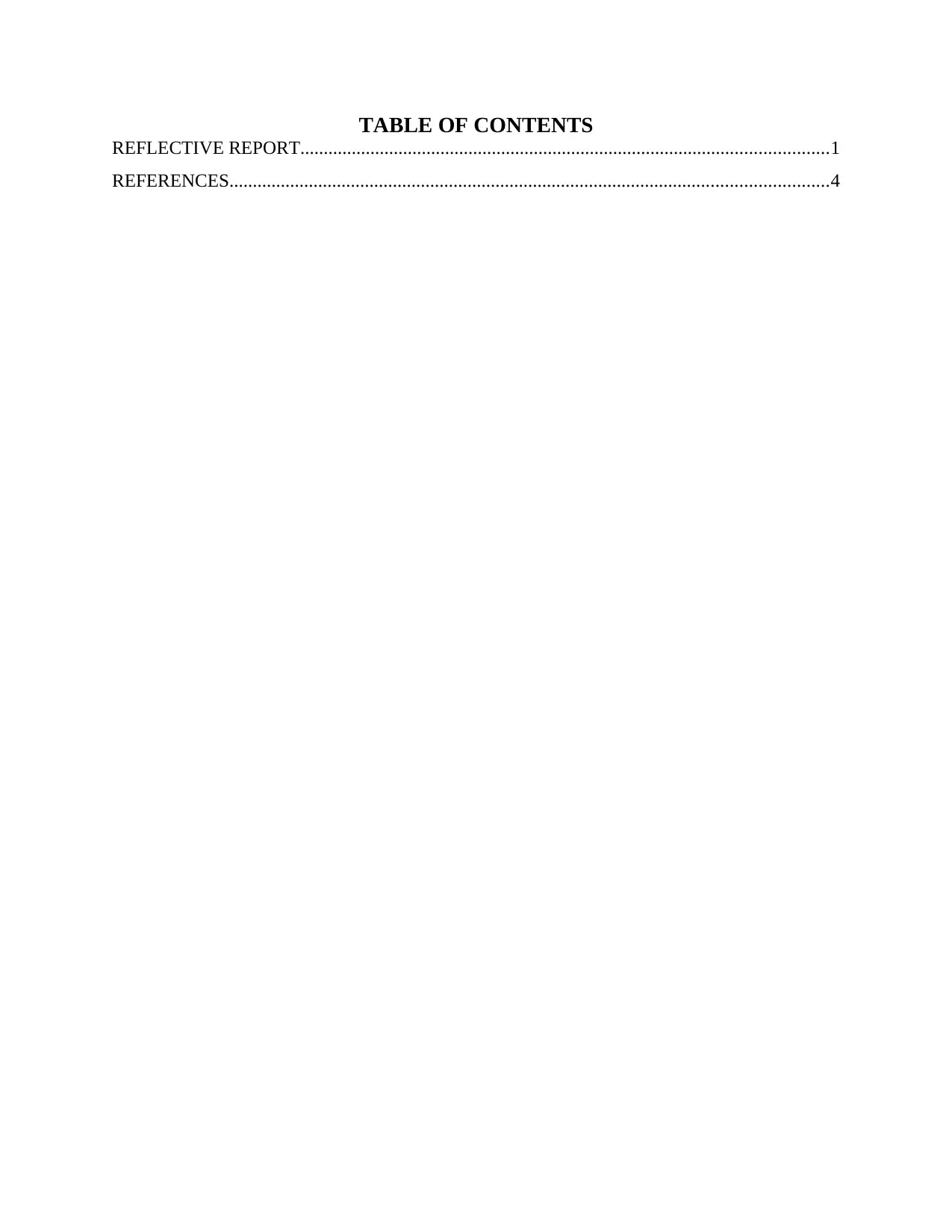
TABLE OF CONTENTS
REFLECTIVE REPORT.................................................................................................................1
REFERENCES................................................................................................................................4
REFLECTIVE REPORT.................................................................................................................1
REFERENCES................................................................................................................................4
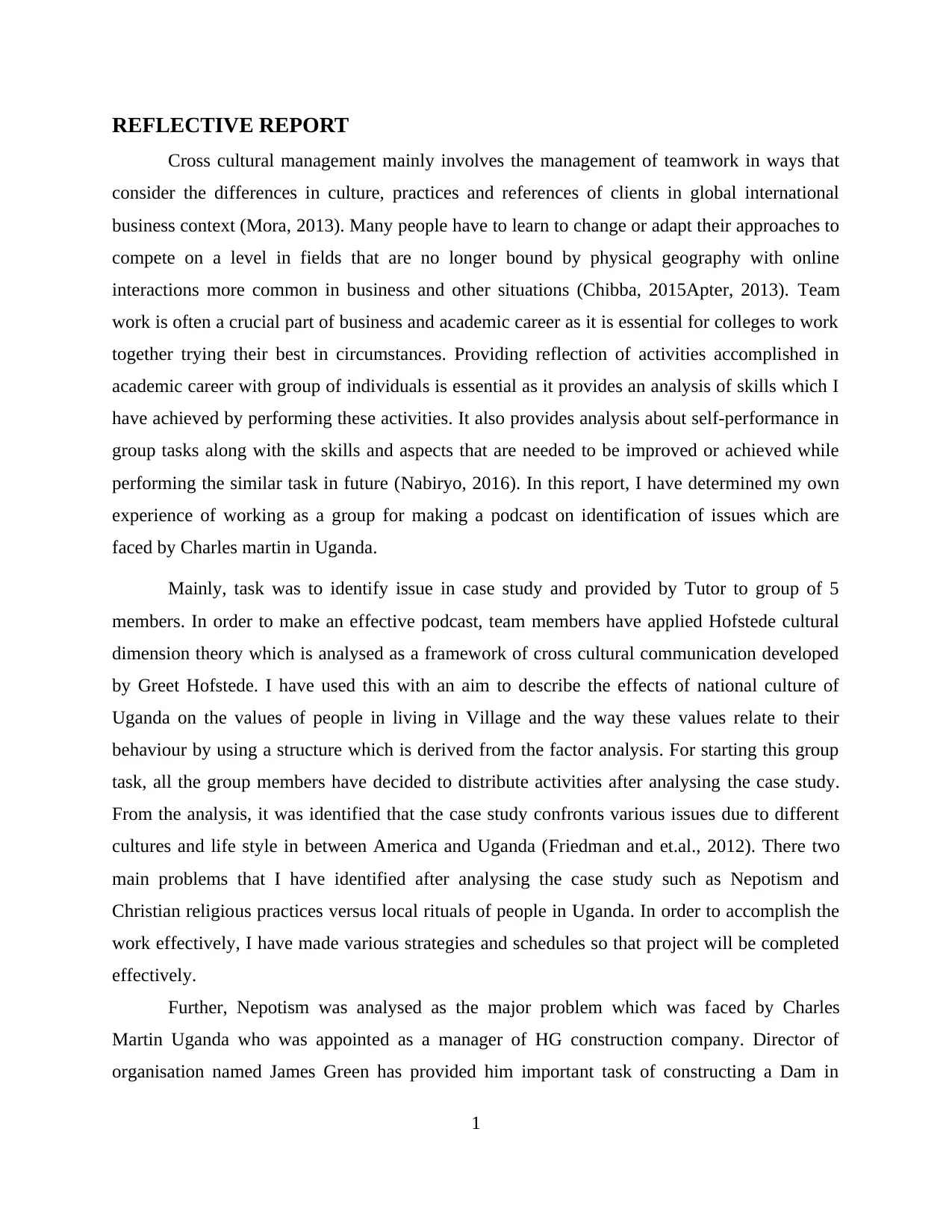
REFLECTIVE REPORT
Cross cultural management mainly involves the management of teamwork in ways that
consider the differences in culture, practices and references of clients in global international
business context (Mora, 2013). Many people have to learn to change or adapt their approaches to
compete on a level in fields that are no longer bound by physical geography with online
interactions more common in business and other situations (Chibba, 2015Apter, 2013). Team
work is often a crucial part of business and academic career as it is essential for colleges to work
together trying their best in circumstances. Providing reflection of activities accomplished in
academic career with group of individuals is essential as it provides an analysis of skills which I
have achieved by performing these activities. It also provides analysis about self-performance in
group tasks along with the skills and aspects that are needed to be improved or achieved while
performing the similar task in future (Nabiryo, 2016). In this report, I have determined my own
experience of working as a group for making a podcast on identification of issues which are
faced by Charles martin in Uganda.
Mainly, task was to identify issue in case study and provided by Tutor to group of 5
members. In order to make an effective podcast, team members have applied Hofstede cultural
dimension theory which is analysed as a framework of cross cultural communication developed
by Greet Hofstede. I have used this with an aim to describe the effects of national culture of
Uganda on the values of people in living in Village and the way these values relate to their
behaviour by using a structure which is derived from the factor analysis. For starting this group
task, all the group members have decided to distribute activities after analysing the case study.
From the analysis, it was identified that the case study confronts various issues due to different
cultures and life style in between America and Uganda (Friedman and et.al., 2012). There two
main problems that I have identified after analysing the case study such as Nepotism and
Christian religious practices versus local rituals of people in Uganda. In order to accomplish the
work effectively, I have made various strategies and schedules so that project will be completed
effectively.
Further, Nepotism was analysed as the major problem which was faced by Charles
Martin Uganda who was appointed as a manager of HG construction company. Director of
organisation named James Green has provided him important task of constructing a Dam in
1
Cross cultural management mainly involves the management of teamwork in ways that
consider the differences in culture, practices and references of clients in global international
business context (Mora, 2013). Many people have to learn to change or adapt their approaches to
compete on a level in fields that are no longer bound by physical geography with online
interactions more common in business and other situations (Chibba, 2015Apter, 2013). Team
work is often a crucial part of business and academic career as it is essential for colleges to work
together trying their best in circumstances. Providing reflection of activities accomplished in
academic career with group of individuals is essential as it provides an analysis of skills which I
have achieved by performing these activities. It also provides analysis about self-performance in
group tasks along with the skills and aspects that are needed to be improved or achieved while
performing the similar task in future (Nabiryo, 2016). In this report, I have determined my own
experience of working as a group for making a podcast on identification of issues which are
faced by Charles martin in Uganda.
Mainly, task was to identify issue in case study and provided by Tutor to group of 5
members. In order to make an effective podcast, team members have applied Hofstede cultural
dimension theory which is analysed as a framework of cross cultural communication developed
by Greet Hofstede. I have used this with an aim to describe the effects of national culture of
Uganda on the values of people in living in Village and the way these values relate to their
behaviour by using a structure which is derived from the factor analysis. For starting this group
task, all the group members have decided to distribute activities after analysing the case study.
From the analysis, it was identified that the case study confronts various issues due to different
cultures and life style in between America and Uganda (Friedman and et.al., 2012). There two
main problems that I have identified after analysing the case study such as Nepotism and
Christian religious practices versus local rituals of people in Uganda. In order to accomplish the
work effectively, I have made various strategies and schedules so that project will be completed
effectively.
Further, Nepotism was analysed as the major problem which was faced by Charles
Martin Uganda who was appointed as a manager of HG construction company. Director of
organisation named James Green has provided him important task of constructing a Dam in
1
⊘ This is a preview!⊘
Do you want full access?
Subscribe today to unlock all pages.

Trusted by 1+ million students worldwide
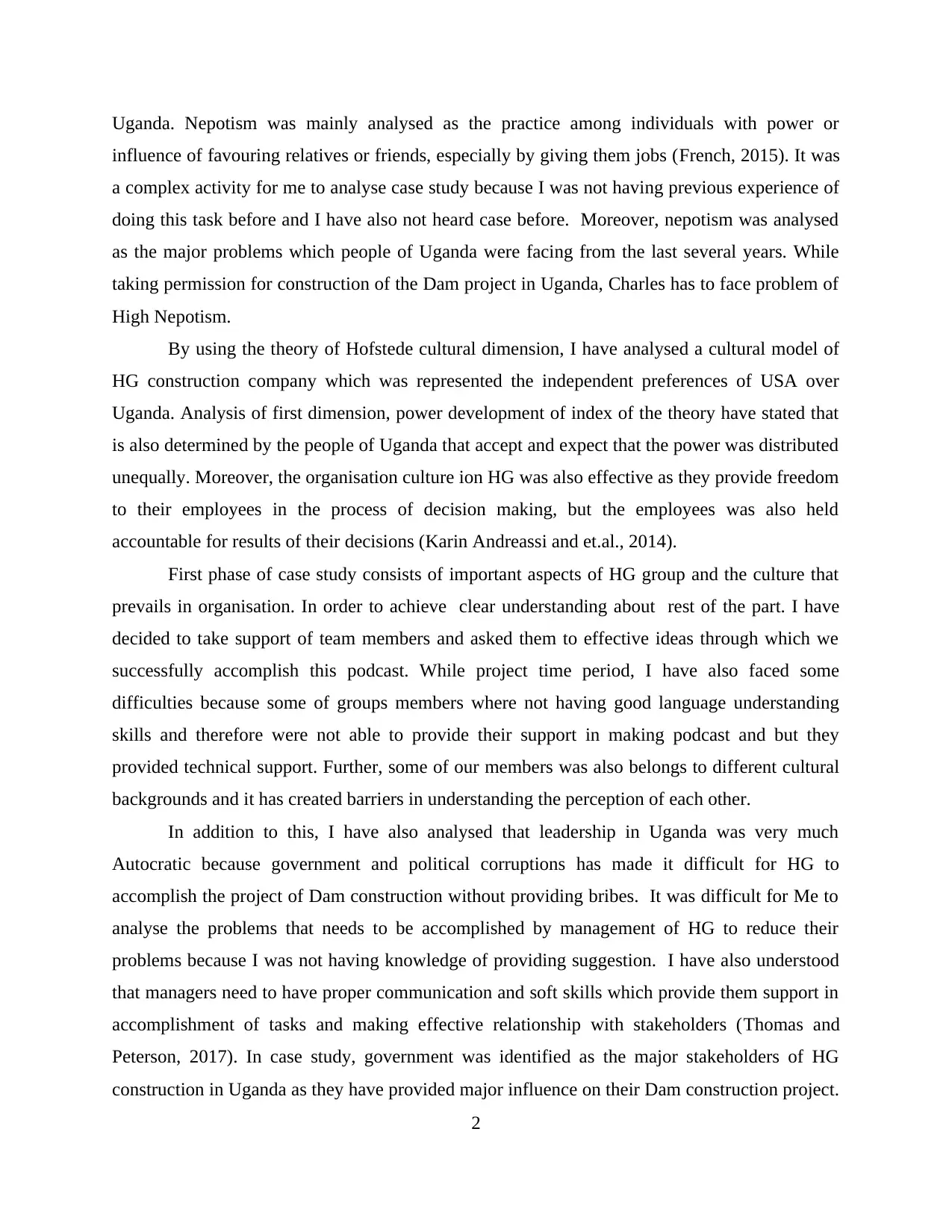
Uganda. Nepotism was mainly analysed as the practice among individuals with power or
influence of favouring relatives or friends, especially by giving them jobs (French, 2015). It was
a complex activity for me to analyse case study because I was not having previous experience of
doing this task before and I have also not heard case before. Moreover, nepotism was analysed
as the major problems which people of Uganda were facing from the last several years. While
taking permission for construction of the Dam project in Uganda, Charles has to face problem of
High Nepotism.
By using the theory of Hofstede cultural dimension, I have analysed a cultural model of
HG construction company which was represented the independent preferences of USA over
Uganda. Analysis of first dimension, power development of index of the theory have stated that
is also determined by the people of Uganda that accept and expect that the power was distributed
unequally. Moreover, the organisation culture ion HG was also effective as they provide freedom
to their employees in the process of decision making, but the employees was also held
accountable for results of their decisions (Karin Andreassi and et.al., 2014).
First phase of case study consists of important aspects of HG group and the culture that
prevails in organisation. In order to achieve clear understanding about rest of the part. I have
decided to take support of team members and asked them to effective ideas through which we
successfully accomplish this podcast. While project time period, I have also faced some
difficulties because some of groups members where not having good language understanding
skills and therefore were not able to provide their support in making podcast and but they
provided technical support. Further, some of our members was also belongs to different cultural
backgrounds and it has created barriers in understanding the perception of each other.
In addition to this, I have also analysed that leadership in Uganda was very much
Autocratic because government and political corruptions has made it difficult for HG to
accomplish the project of Dam construction without providing bribes. It was difficult for Me to
analyse the problems that needs to be accomplished by management of HG to reduce their
problems because I was not having knowledge of providing suggestion. I have also understood
that managers need to have proper communication and soft skills which provide them support in
accomplishment of tasks and making effective relationship with stakeholders (Thomas and
Peterson, 2017). In case study, government was identified as the major stakeholders of HG
construction in Uganda as they have provided major influence on their Dam construction project.
2
influence of favouring relatives or friends, especially by giving them jobs (French, 2015). It was
a complex activity for me to analyse case study because I was not having previous experience of
doing this task before and I have also not heard case before. Moreover, nepotism was analysed
as the major problems which people of Uganda were facing from the last several years. While
taking permission for construction of the Dam project in Uganda, Charles has to face problem of
High Nepotism.
By using the theory of Hofstede cultural dimension, I have analysed a cultural model of
HG construction company which was represented the independent preferences of USA over
Uganda. Analysis of first dimension, power development of index of the theory have stated that
is also determined by the people of Uganda that accept and expect that the power was distributed
unequally. Moreover, the organisation culture ion HG was also effective as they provide freedom
to their employees in the process of decision making, but the employees was also held
accountable for results of their decisions (Karin Andreassi and et.al., 2014).
First phase of case study consists of important aspects of HG group and the culture that
prevails in organisation. In order to achieve clear understanding about rest of the part. I have
decided to take support of team members and asked them to effective ideas through which we
successfully accomplish this podcast. While project time period, I have also faced some
difficulties because some of groups members where not having good language understanding
skills and therefore were not able to provide their support in making podcast and but they
provided technical support. Further, some of our members was also belongs to different cultural
backgrounds and it has created barriers in understanding the perception of each other.
In addition to this, I have also analysed that leadership in Uganda was very much
Autocratic because government and political corruptions has made it difficult for HG to
accomplish the project of Dam construction without providing bribes. It was difficult for Me to
analyse the problems that needs to be accomplished by management of HG to reduce their
problems because I was not having knowledge of providing suggestion. I have also understood
that managers need to have proper communication and soft skills which provide them support in
accomplishment of tasks and making effective relationship with stakeholders (Thomas and
Peterson, 2017). In case study, government was identified as the major stakeholders of HG
construction in Uganda as they have provided major influence on their Dam construction project.
2
Paraphrase This Document
Need a fresh take? Get an instant paraphrase of this document with our AI Paraphraser
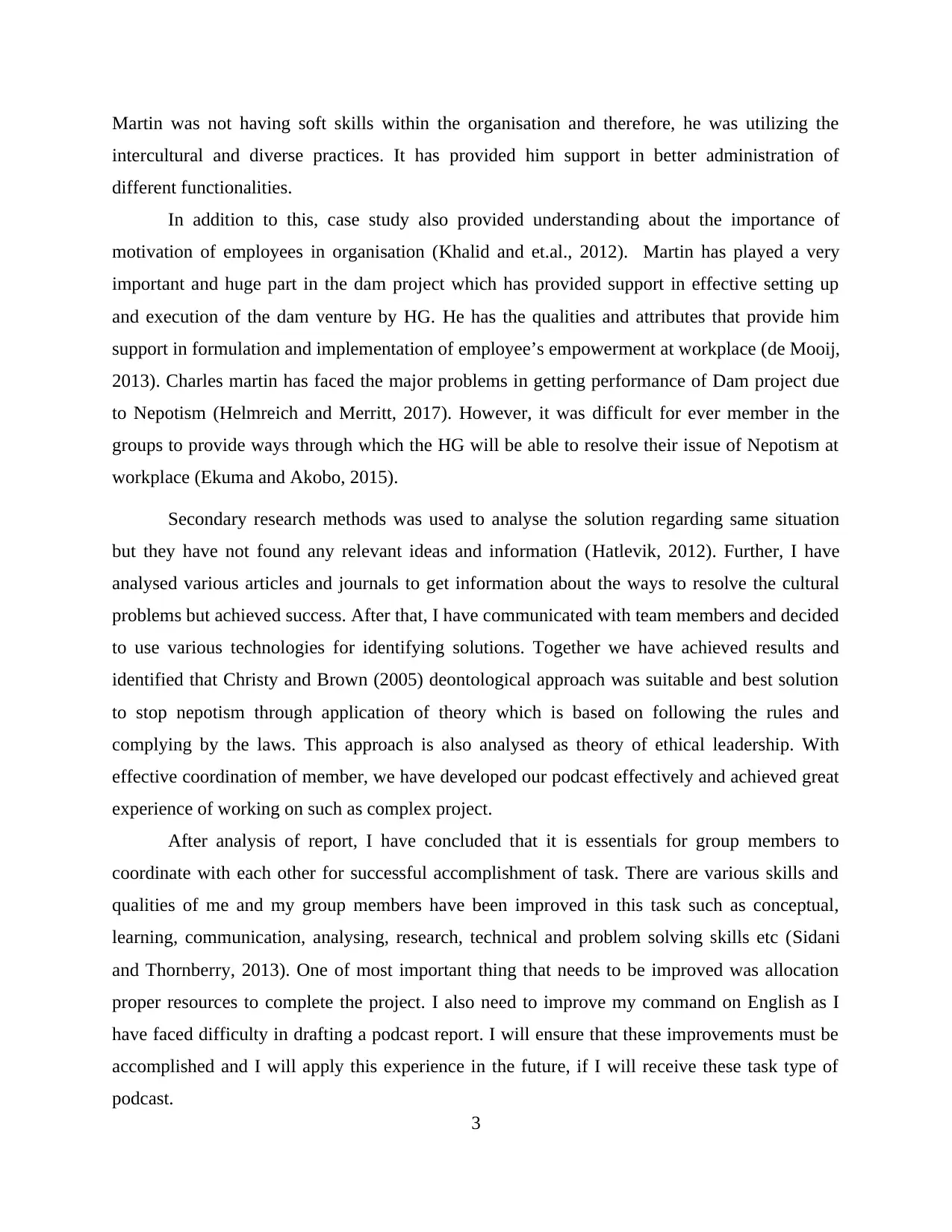
Martin was not having soft skills within the organisation and therefore, he was utilizing the
intercultural and diverse practices. It has provided him support in better administration of
different functionalities.
In addition to this, case study also provided understanding about the importance of
motivation of employees in organisation (Khalid and et.al., 2012). Martin has played a very
important and huge part in the dam project which has provided support in effective setting up
and execution of the dam venture by HG. He has the qualities and attributes that provide him
support in formulation and implementation of employee’s empowerment at workplace (de Mooij,
2013). Charles martin has faced the major problems in getting performance of Dam project due
to Nepotism (Helmreich and Merritt, 2017). However, it was difficult for ever member in the
groups to provide ways through which the HG will be able to resolve their issue of Nepotism at
workplace (Ekuma and Akobo, 2015).
Secondary research methods was used to analyse the solution regarding same situation
but they have not found any relevant ideas and information (Hatlevik, 2012). Further, I have
analysed various articles and journals to get information about the ways to resolve the cultural
problems but achieved success. After that, I have communicated with team members and decided
to use various technologies for identifying solutions. Together we have achieved results and
identified that Christy and Brown (2005) deontological approach was suitable and best solution
to stop nepotism through application of theory which is based on following the rules and
complying by the laws. This approach is also analysed as theory of ethical leadership. With
effective coordination of member, we have developed our podcast effectively and achieved great
experience of working on such as complex project.
After analysis of report, I have concluded that it is essentials for group members to
coordinate with each other for successful accomplishment of task. There are various skills and
qualities of me and my group members have been improved in this task such as conceptual,
learning, communication, analysing, research, technical and problem solving skills etc (Sidani
and Thornberry, 2013). One of most important thing that needs to be improved was allocation
proper resources to complete the project. I also need to improve my command on English as I
have faced difficulty in drafting a podcast report. I will ensure that these improvements must be
accomplished and I will apply this experience in the future, if I will receive these task type of
podcast.
3
intercultural and diverse practices. It has provided him support in better administration of
different functionalities.
In addition to this, case study also provided understanding about the importance of
motivation of employees in organisation (Khalid and et.al., 2012). Martin has played a very
important and huge part in the dam project which has provided support in effective setting up
and execution of the dam venture by HG. He has the qualities and attributes that provide him
support in formulation and implementation of employee’s empowerment at workplace (de Mooij,
2013). Charles martin has faced the major problems in getting performance of Dam project due
to Nepotism (Helmreich and Merritt, 2017). However, it was difficult for ever member in the
groups to provide ways through which the HG will be able to resolve their issue of Nepotism at
workplace (Ekuma and Akobo, 2015).
Secondary research methods was used to analyse the solution regarding same situation
but they have not found any relevant ideas and information (Hatlevik, 2012). Further, I have
analysed various articles and journals to get information about the ways to resolve the cultural
problems but achieved success. After that, I have communicated with team members and decided
to use various technologies for identifying solutions. Together we have achieved results and
identified that Christy and Brown (2005) deontological approach was suitable and best solution
to stop nepotism through application of theory which is based on following the rules and
complying by the laws. This approach is also analysed as theory of ethical leadership. With
effective coordination of member, we have developed our podcast effectively and achieved great
experience of working on such as complex project.
After analysis of report, I have concluded that it is essentials for group members to
coordinate with each other for successful accomplishment of task. There are various skills and
qualities of me and my group members have been improved in this task such as conceptual,
learning, communication, analysing, research, technical and problem solving skills etc (Sidani
and Thornberry, 2013). One of most important thing that needs to be improved was allocation
proper resources to complete the project. I also need to improve my command on English as I
have faced difficulty in drafting a podcast report. I will ensure that these improvements must be
accomplished and I will apply this experience in the future, if I will receive these task type of
podcast.
3
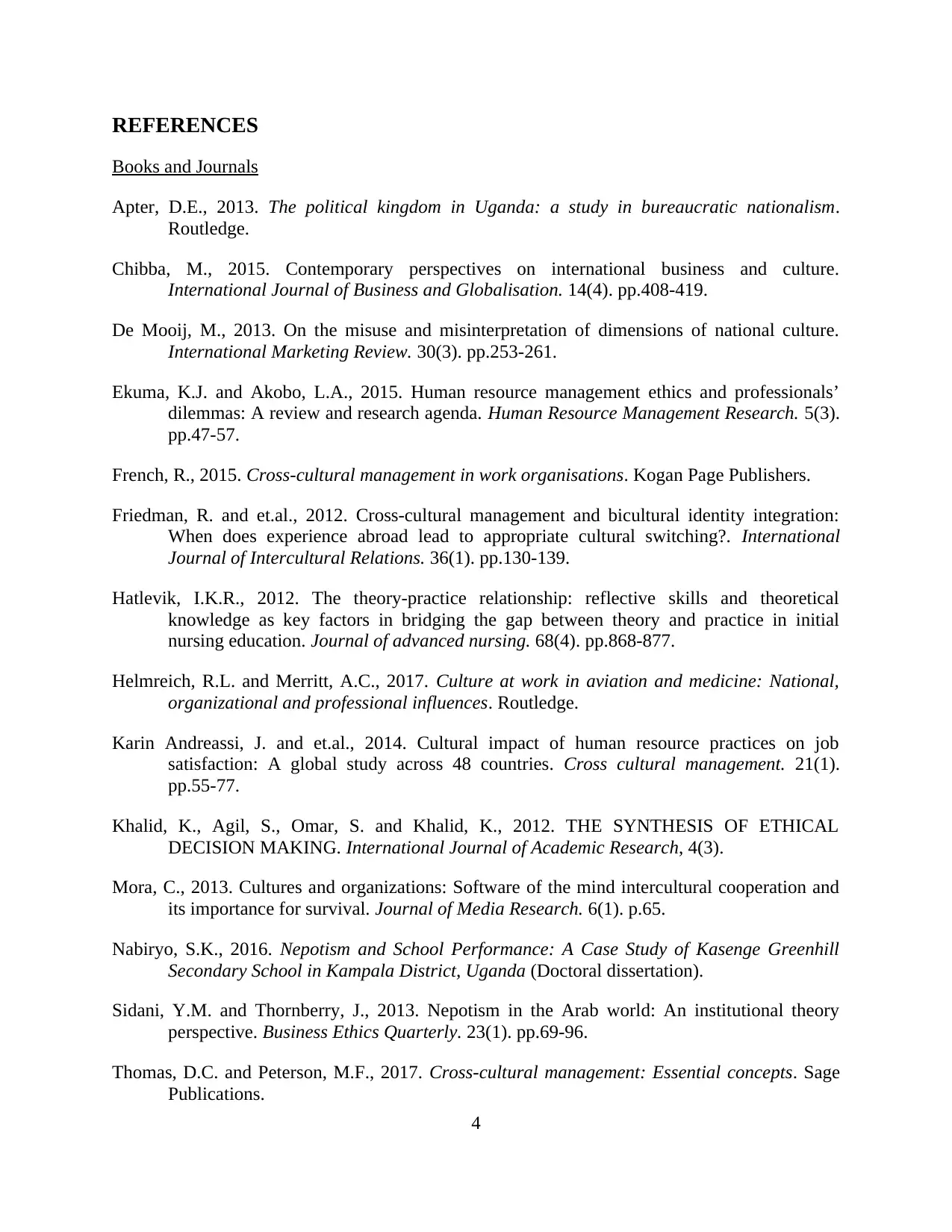
REFERENCES
Books and Journals
Apter, D.E., 2013. The political kingdom in Uganda: a study in bureaucratic nationalism.
Routledge.
Chibba, M., 2015. Contemporary perspectives on international business and culture.
International Journal of Business and Globalisation. 14(4). pp.408-419.
De Mooij, M., 2013. On the misuse and misinterpretation of dimensions of national culture.
International Marketing Review. 30(3). pp.253-261.
Ekuma, K.J. and Akobo, L.A., 2015. Human resource management ethics and professionals’
dilemmas: A review and research agenda. Human Resource Management Research. 5(3).
pp.47-57.
French, R., 2015. Cross-cultural management in work organisations. Kogan Page Publishers.
Friedman, R. and et.al., 2012. Cross-cultural management and bicultural identity integration:
When does experience abroad lead to appropriate cultural switching?. International
Journal of Intercultural Relations. 36(1). pp.130-139.
Hatlevik, I.K.R., 2012. The theory‐practice relationship: reflective skills and theoretical
knowledge as key factors in bridging the gap between theory and practice in initial
nursing education. Journal of advanced nursing. 68(4). pp.868-877.
Helmreich, R.L. and Merritt, A.C., 2017. Culture at work in aviation and medicine: National,
organizational and professional influences. Routledge.
Karin Andreassi, J. and et.al., 2014. Cultural impact of human resource practices on job
satisfaction: A global study across 48 countries. Cross cultural management. 21(1).
pp.55-77.
Khalid, K., Agil, S., Omar, S. and Khalid, K., 2012. THE SYNTHESIS OF ETHICAL
DECISION MAKING. International Journal of Academic Research, 4(3).
Mora, C., 2013. Cultures and organizations: Software of the mind intercultural cooperation and
its importance for survival. Journal of Media Research. 6(1). p.65.
Nabiryo, S.K., 2016. Nepotism and School Performance: A Case Study of Kasenge Greenhill
Secondary School in Kampala District, Uganda (Doctoral dissertation).
Sidani, Y.M. and Thornberry, J., 2013. Nepotism in the Arab world: An institutional theory
perspective. Business Ethics Quarterly. 23(1). pp.69-96.
Thomas, D.C. and Peterson, M.F., 2017. Cross-cultural management: Essential concepts. Sage
Publications.
4
Books and Journals
Apter, D.E., 2013. The political kingdom in Uganda: a study in bureaucratic nationalism.
Routledge.
Chibba, M., 2015. Contemporary perspectives on international business and culture.
International Journal of Business and Globalisation. 14(4). pp.408-419.
De Mooij, M., 2013. On the misuse and misinterpretation of dimensions of national culture.
International Marketing Review. 30(3). pp.253-261.
Ekuma, K.J. and Akobo, L.A., 2015. Human resource management ethics and professionals’
dilemmas: A review and research agenda. Human Resource Management Research. 5(3).
pp.47-57.
French, R., 2015. Cross-cultural management in work organisations. Kogan Page Publishers.
Friedman, R. and et.al., 2012. Cross-cultural management and bicultural identity integration:
When does experience abroad lead to appropriate cultural switching?. International
Journal of Intercultural Relations. 36(1). pp.130-139.
Hatlevik, I.K.R., 2012. The theory‐practice relationship: reflective skills and theoretical
knowledge as key factors in bridging the gap between theory and practice in initial
nursing education. Journal of advanced nursing. 68(4). pp.868-877.
Helmreich, R.L. and Merritt, A.C., 2017. Culture at work in aviation and medicine: National,
organizational and professional influences. Routledge.
Karin Andreassi, J. and et.al., 2014. Cultural impact of human resource practices on job
satisfaction: A global study across 48 countries. Cross cultural management. 21(1).
pp.55-77.
Khalid, K., Agil, S., Omar, S. and Khalid, K., 2012. THE SYNTHESIS OF ETHICAL
DECISION MAKING. International Journal of Academic Research, 4(3).
Mora, C., 2013. Cultures and organizations: Software of the mind intercultural cooperation and
its importance for survival. Journal of Media Research. 6(1). p.65.
Nabiryo, S.K., 2016. Nepotism and School Performance: A Case Study of Kasenge Greenhill
Secondary School in Kampala District, Uganda (Doctoral dissertation).
Sidani, Y.M. and Thornberry, J., 2013. Nepotism in the Arab world: An institutional theory
perspective. Business Ethics Quarterly. 23(1). pp.69-96.
Thomas, D.C. and Peterson, M.F., 2017. Cross-cultural management: Essential concepts. Sage
Publications.
4
⊘ This is a preview!⊘
Do you want full access?
Subscribe today to unlock all pages.

Trusted by 1+ million students worldwide

5
1 out of 7
Related Documents
Your All-in-One AI-Powered Toolkit for Academic Success.
+13062052269
info@desklib.com
Available 24*7 on WhatsApp / Email
![[object Object]](/_next/static/media/star-bottom.7253800d.svg)
Unlock your academic potential
Copyright © 2020–2026 A2Z Services. All Rights Reserved. Developed and managed by ZUCOL.





